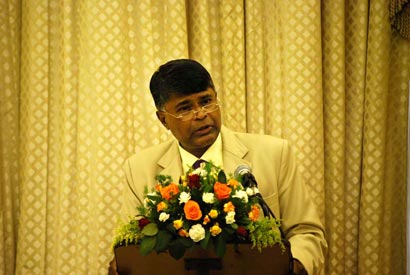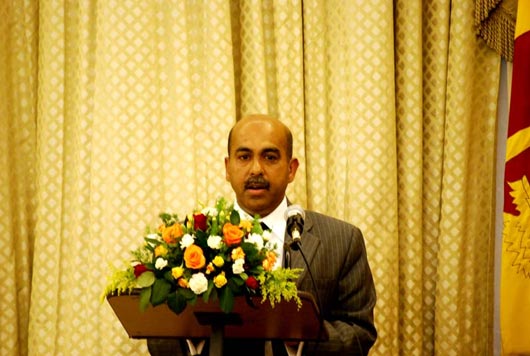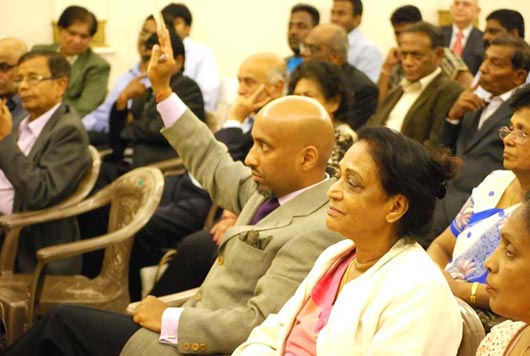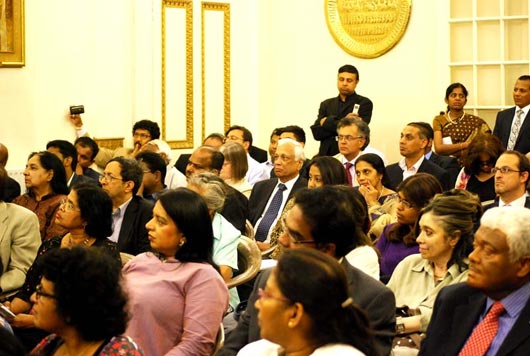“See No Good, Hear No Good, Speak No Good” attitude will not help Sri Lanka – Prof. Rajiva Wijesinha, MP

Onlanka News – By Janaka Alahapperuma
A cross section of academics, journalists, opinion makers and members of the Sri Lankan Diaspora in the UK met at the Sri Lanka High Commission in London on July 5th with Adviser to the President on Reconciliation Prof. Rajiva Wijesinha. In his opening remarks, Prof Wijesinha noted that the Darusman Report, as well as the selective coverage by Channel 4 of what they had termed ‘Sri Lanka’s Killing Fields’ had contributed to polarization amongst Sri Lankans which inhibited efforts at reconciliation. Such forces, which often worked in tandem, presenting the same biased and often doctored material in different guises, were then used by separatist forces operating outside the country,
Prof. Wijesinha’s presentation entitled ‘Reconciliation in the Context of Channel 4 allegations” also included a comprehensive briefing on post-conflict re-building endeavours. Explaining the progress made in many areas of concern within a relatively short period against numerous constraints, Prof. Wijesinha said that it is time that the international community acknowledges this aspect. Though fears had been expressed in 2009 about Resettlement and Reconstruction, none of the progress in these areas was acknowledged. What seemed a general attitude of “See no Good, Hear No Good, Speak No Good”, ignoring the positive reactions of international agencies on the ground in Sri Lanka, would not help with moving the people of the country together towards prosperity.
Prof. Wijesinha also called all friends of Sri Lanka and Sri Lankan expatriates of all ethnicities to come forward and lend a hand to the Government in its re-building efforts and also to ensure stability in the country. He expressed hope that a suitable political solution will evolve sooner than later, while sharing with the gathering of about 150 guests the status of ongoing talks with the Tamil National Alliance.
The address was followed by a wide-ranging question and answer session in which, amongst others, issues with regard to language rights and training, accountability and communications were addressed. The full text of Prof. Wijesinha’s statement is attached.
Sri Lanka High Commission
London
6th July 2011



Latest Headlines in Sri Lanka
- Sri Lanka declares essential services to ensure recovery after Cyclone Ditwah January 31, 2026
- Sri Lanka disburses Rs. 50,000 relief to 70% of Cyclone Ditwah victims January 31, 2026
- Sri Lanka to launch national review on social media’s impact on children January 30, 2026
- Sri Lanka, Saudi Arabia move to boost industrial cooperation January 30, 2026
- Johnston Fernando, two sons and others further remanded until February 13, 2026 January 30, 2026



That’s an absolutly truth. It seems that all fu**ing buggers looking only falts of others, despite having own fu**ing faults.
“anunge weradi passaha – thamunge weradi issaraha”
The imperial West, in collusion with the Tamil diaspora, TNA and extremist TN elements, are following an evil agenda to drive a wedge between the government of SL and the patriotic Tamils in SL, to stir-up the fires of racial hatred again and militarism. This is in retaliation for daring to defy the imperial West instructions to govt of SL to stop the Humanitartian Operation to rescue Tamil hostages and totally annhilate LTTE. They will then try to manipulate UNSC, UNGA and UNHRC to pass resolutions against SL to unleash military campaign by NATO forces to unseat the current democratically elected strong govt of SL in order to put in place a puppet govt obedient to dictats of imperial West.
Our response should be to have a special defence pact with Russia and China and stronger ties, to counter the evil agenda of imperial West.
Nicholas, You seem like a man who has a very good idea about most things. I am wondering if there is a way to get hold of a powerful international law firm and sue these imperial bastards if we can prove that thes the footage shown was all a lie doctored by the LTTE.
“A cross section of academics, journalists, opinion makers and members of the Sri Lankan Diaspora in the UK…..”
I cannot see a single Tamil in this audience. This group appears to be a group of bored Sri Lankana expatriate Londeners who had nothing better to do than to listen to the HC and Looney Prof Wijesinghe.
I sure can picture what happened after the event; duty free alcohol and nibblies funded by Sri Lankan taxpayers and the Middle eastern expatriate maids, flowed like the waters of the Mahaweli River.
Come off it, Professor, you were soundly beaten my BBC’s Sakur where you had to stutter to save your skin. Are you now competing with Shavendra? The guy’s a million times better than you, dear Prof, even though his language is Native Sri Lankan English.
In fact, Shavendra was so effective that he instantaneously converted a number of Eelamists who were demonstrating in the cold in New York eventually leading to handshakes between the parties.
Gamaya,
Whom do you like to sue? There’s a guy in the UN who claims the videos are authentic. We should take him to courts and let the courts examine the authenticity of the videos. That will be killing the problem at the roots.
Our Blue Brothers have produced their own video. One of them was referring to the video as a “byscope”. The whole nation appears to be a pack of jokers.
There is one and only one solution to this problem. Load all the Kalla T’s into the ships which were seized from the LTT and send them off to Big Mama land so that we can live in peace. As long as these Kalla T’s are in SL enjoying our benevolence, their brothers in the west who are good at sucking up to whites will always be dreaming of Eelam.
I also suggest a video of LTT atrocities be made and sent to western TV for braodcasting. I am sure Govt Media Unit and Rupavahini have enough stuff to make a four part series of 3 hours each. The video can include how the LTT chopped of hands and legs and heads of Sinhala villagers when they sleeping in their huts. Also the killing caused by their teen suicide bombers who pulled the switch in public places, buses, trains and anywhere.
Dear Gamaya
Govt of SL is already in the process of instituting legal proceedings against CH 4 for mischievous dissemination of false, scurrilous propaganda of the diaspora Tamils/LTTE. The evidence is plentiful that the documentary has not a shred of truth. CH 4 is just a tool of the diaspora LTTE/Tamils to discredit the government of SL before the world. It is libel against a country. SL has a right to defend its good name against such libel by diaspora Tamils/LTTE who are smarting at the most humiliating utter defeat of the so-called fiercest terrorist group in the world, who were aided by Norway overtly and by the imperial West covertly.
Ch 4 is being investigated by OFTEL, a UK organisation to maintain good ethical broadcasting standards in the TV media, following complaint to it by the govt of SL.
SL has a good chance of winning its case against CH 4 in UK High Court. SL should be awarded a high compensation which will make CH 4 bankrupt. Winning the case against CH 4 alone should suffice to restore our image in the world’s eyes. This matters most. The compensation is just the cream on top.
Nicholas,
Thank You for the information.It is good to hear that the Govenrment of Sri Lanka is in the process of sueing ch 4.
What annoys me most is that for decades the LTTE were using child soldiers, killing innocent civillians with suicide bombs and so on but the united nation and all of the countries carrying on about war crimes did not bother to take action aginst the LTTE leaders.
According to my friends and relatives living in Australia the documentry was broadcast about a week ago and the sinhalese are getting hammered by the Aussies who are generally mind their own buisness. This documentry has painted a very bad picture about the sinhala people and it will take a lot of undoing to put things right. So lets keep our fingers crossed and hope that we can return the favour and screw channell 4 once and for all.
Dear Gamaya,
Suing Channel 4 will not get SL anywhere. The problem arises for the UN guy who said the videos are authentic. We should prove him wrong and possibly move a motion of no confidence gainst him in the UN.
Also important is the tele series on LTT atrocities. That will be the opinion turner. I encourage Basil Uncle to proceed with this project. He appears to be the only person with brains in this whole episode.
Als we should engage with Big Mama in TN on the mass expatriation of Kalla T’s. As long as the Kalla T’s are within our shores, the LTT remnant rup will not give up their Sun God’s dream of tamil eelam.
Guru, If the videos are not authentic why has it taken so long to prove that they are not. This is a matter of national interest why does’nt some one get of their fat arse and get the ball rolling. After all the longer this goes on the more proples minds around the globe are beeing poisoned by this documantary.
Like you suggested we also need to produce a documentary that shows how many tamils are living in Colombo and owining and running their own buisnesses. If neccasary their should be some statistics showing the perscentage of tamils owning big buisnesses in Colombo and the rest of Sri Lanka. The impresision the western world has is that all tamils are being discriminated in Sr Lanka.
Dear Gamaya,
I cannot agree to show tele movies of rich Kalla T’s living in the cites. They all in boats by stealth at night. After they arrived the sucked the white rulers, got education and grabbed the wealth from our land.
The parasitic Kalla T’s should all be sent back to where they come in the first place. That is back to Big Mama land.
The Sinhala people never discriminated the parasites. We gave them more than what we gave the Sinhala Buddhists. The more we gave them, the more they asked for.
We should encourage Sinhala movie makers to focus on the war from 1983-2009. They should be given free access to military and Rupavahini video footage to enablem them to make captivating movies showing the atrocities caused by the Sun God and his tribe.
The remnant LTTE rump overseas have produced videos using high technology and it will be difficult to challenge their authenticity.
The approach to this issue should be three pronged:
1. Publish a video series on LTT atrocities and broadcast in western and Indian TV.
2. No confidence motion in the UN against the UN official who claims authenticity of the war crime video
3. Engage with Big Mama and Manmohan Singh to expatriate all Kalla T’s from our shores
This approach will counter propoganda by the LTT remnant rump. Remember, it the overseas based learned Kalla T’s who financed the Sun God to cause all the atrocities on innocent Sinhala civilans. These people are persistent in their efforts and never give up. We should counter their violenceless terrorism with an intelligent, well co-ordinated and persistent effort to shut them up once and for all.
The softy-softy approach will never work.
Guru Your thoughts of sending all the Kalla T’s to big mama land has croseed my mind. But I don’ think it is a viable option given the number of them in our country.
But you are right we have to fight the LTTE menace intelligently and persistantly.